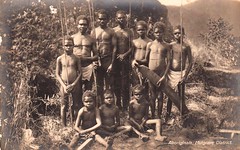Climate Change Fuels New Colonialism in Australia
Alex Bobeczko and Jack Lueddeke
Aborigines are the native groups of people residing on mainland Australia. Our project will delve into Aboriginal histories and look at more modern examples of how climate change has taken a toll on this population of people. We believe this is a lesser known environmental issue that needs to be viewed on a global scale. Climate change has and will continue to affect indigenous groups in Australia more harshly than non-indigenous groups, due to Aboriginal ties to the natural world, and the legacy of colonialism on mainland Australia.
Key Words:
De-colonization, Environmental Racism, Environmental Justice, Place-making
Table of Contents:
Effects of Climate Change in General
Western Science vs. Indigenous Knowledge: Combating Climate Change
Works Cited
Austin, Beau J., et al. “Integrated Measures of Indigenous Land and Sea Management Effectiveness: Challenges and Opportunities for Improved Conservation Partnerships in Australia.” Conservation and Society, vol. 16, no. 3, 2018, pp. 372–384. JSTOR.
Blakemore, Erin. “Aboriginal Australians.” National Geographic. Culture & History. January 31, 2019.
Cassidy, Julie. “The Legacy of Colonialism.” The American Journal of Comparative Law, vol. 51, no. 2, 2003, pp. 409–455. JSTOR.
“CLIMATE CHANGE ATTITUDES AND KNOWLEDGE.” Communicating Climate Change: A Guide for Educators, by Anne K. Armstrong et al., Cornell University Press, ITHACA; LONDON, 2018, pp. 21–24. JSTOR.
Coombes, Anne. Rethinking Settler Colonialism: History and Memory in Australia, Canada, New Zealand, and South Africa. Manchester University Press. Manchester, UK. 2012
Gerrard, Emily. “Towards a Carbon Constrained Future: Climate Change, Emissions Trading and Indigenous Peoples’ Rights in Australia.” Country, Native Title and Ecology, edited by Jessica K Weir, vol. 24, ANU Press, 2012, pp. 135–174. JSTOR.
“Global Climate Change: Effects.” NASA, NASA, 28 Nov. 2018.
Godsil, Rachel D. “Remedying Environmental Racism.” Michigan Law Review, vol. 90, no. 2, 1991, pp. 394–427. JSTOR.
Green, Donna, and Leanne Webb. “Climate Change, Health and Well-Being in Indigenous Australia.” Health of People, Places and Planet: Reflections Based on Tony McMichael’s Four Decades of Contribution to Epidemiological Understanding, edited by Colin D. Butler et al., ANU Press, 2015, pp. 365–378. JSTOR.
Firth, Stewart. “Decolonization.” Remembrance of Pacific Pasts: An Invitation to Remake History, edited by Robert Borofsky. by Edward Said et al., University of Hawai’i Press, 2000, pp. 314–332. JSTOR.
Heathcote, Angela. “How Indigenous knowledge might inform our response to climate change”. Australia Geographic. 2015.
Humboldt, Alexander von. “Political essay on the kingdom of New Spain…” London :Printed for Longman, Hurst, Rees, Orme and Brown … and H. Colburn …,1811.
Petheram, L., Zander, K., et al. “‘Strange changes’: Indigenous perspectives of climate change and adaptation in NE Arnhem Land (Australia)”. Global Environmental Change. Vo. 20, Iss. 4. Pgs. 681-692. 2010.
Prober, Suzanne M., et al. “Australian Aboriginal Peoples’ Seasonal Knowledge: a Potential Basis for Shared Understanding in Environmental Management.” Ecology and Society, vol. 16, no. 2, 2011. JSTOR.
Wulf, Andrea. The Invention of Nature: Alexander von Humboldt’s New World. Vintage Books, Penguin Random House. New York. 2015
